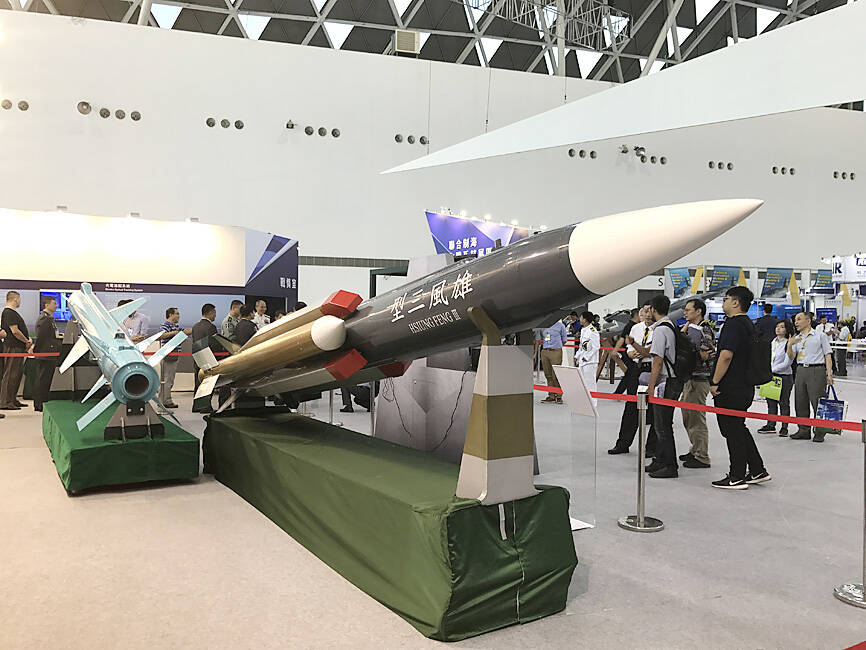A NT$16.9 billion (US$534.93 million) project to upgrade the military’s missile defense systems would be completed this year, allowing the deployment of at least 100 long-range Hsiung Sheng missiles and providing more deterrence against China, military sources said on Saturday.
Hsiung Sheng missiles are an extended-range version of the Hsiung Feng IIE (HF-2E) surface-to-surface cruise missile, and are believed to have a range of up to 1,200km, which would allow them to hit targets well inside China.
They went into mass production in 2022, the sources said.

Photo: Hung Chen-hung, Taipei Times
The project is part of a special budget for the Ministry of National Defense aimed at improving naval and air combat capabilities, and while the project’s time line was four years, the majority of production would be completed this year, they said.
Two other versions of the HF-2E missile system are already in use by the air force. They are classified as either Type A or Type B, with Type A having a range of 500km and Type B having a range of 1,000km due to their different propulsion systems.
The military developed a new turbofan engine codenamed Kunpeng (鯤鵬) for the Type B missile, which is able to fly farther while conserving fuel, one source said.
The Type A missile was first tested in 2004, and the Type B in 2007, the source said, adding that both have since been in regular mass production and supplied to the air force’s missile brigade.
“The new longer-range surface-to-surface cruise missile ... looks similar to the American Tomahawk,” the source said.
Although the ministry has not specifically disclosed the range of the Hsiung Sheng, sources have put it at up to 1,200km.
A report submitted to the Legislative Yuan in April 2022 revealed that the Hsiung Sheng can carry high-explosive and fragmentation warheads.
“It can be used to conduct counter-attack operations against the enemy’s command posts, bunkers and airport runways,” the source said.
A previous report from the ministry to the Legislative Yuan also said that the Hsiung Sheng shares a production line with the surface-to-air variants of the Hsiung Feng IIE.
Although the military has not announced expected production capacity, a new missile production plant at the Chungshan Institute of Science and Technology would likely allow more than 130 of the new missiles to be produced annually, the source said.
“When deployed alongside existing sea and air defense missile systems, the extended-range missile would improve overall combat readiness significantly,” the source said.

INVESTIGATION: The case is the latest instance of a DPP figure being implicated in an espionage network accused of allegedly leaking information to Chinese intelligence Democratic Progressive Party (DPP) member Ho Jen-chieh (何仁傑) was detained and held incommunicado yesterday on suspicion of spying for China during his tenure as assistant to then-minister of foreign affairs Joseph Wu (吳釗燮). The Taipei District Prosecutors’ Office said Ho was implicated during its investigation into alleged spying activities by former Presidential Office consultant Wu Shang-yu (吳尚雨). Prosecutors said there is reason to believe Ho breached the National Security Act (國家安全法) by leaking classified Ministry of Foreign Affairs information to Chinese intelligence. Following interrogation, prosecutors petitioned the Taipei District Court to detain Ho, citing concerns over potential collusion or tampering of evidence. The

NEGOTIATIONS: The US response to the countermeasures and plans Taiwan presented has been positive, including boosting procurement and investment, the president said Taiwan is included in the first group for trade negotiations with the US, President William Lai (賴清德) said yesterday, as he seeks to shield Taiwanese exporters from a 32 percent tariff. In Washington, US Trade Representative Jamieson Greer said in an interview on Fox News on Thursday that he would speak to his Taiwanese and Israeli counterparts yesterday about tariffs after holding a long discussion with the Vietnamese earlier. US President Donald Trump on Wednesday postponed punishing levies on multiple trade partners, including Taiwan, for three months after trillions of US dollars were wiped off global markets. He has maintained a 10 percent

TRADE: The premier pledged safeguards on ‘Made in Taiwan’ labeling, anti-dumping measures and stricter export controls to strengthen its position in trade talks Products labeled “made in Taiwan” must be genuinely made in Taiwan, Premier Cho Jung-tai (卓榮泰) said yesterday, vowing to enforce strict safeguards against “origin laundering” and initiate anti-dumping investigations to prevent China dumping its products in Taiwan. Cho made the remarks in a discussion session with representatives from industries in Kaohsiung. In response to the US government’s recent announcement of “reciprocal” tariffs on its trading partners, President William Lai (賴清德) and Cho last week began a series of consultations with industry leaders nationwide to gather feedback and address concerns. Taiwanese and US officials held a videoconference on Friday evening to discuss the

PERSONAL DATA: The implicated KMT members allegedly compiled their petitions by copying names from party lists without the consent of the people concerned Judicial authorities searched six locations yesterday and questioned six people, including one elderly Chinese Nationalist Party (KMT) member and five KMT Youth League associates, about alleged signature forgery and fraud relating to their recall efforts against two Democratic Progressive Party (DPP) legislators. After launching a probe into alleged signature forgery and related fraud in the KMT’s recall effort, prosecutors received a number of complaints, including about one petition that had 1,748 signatures of voters whose family members said they had already passed away, and also voters who said they did not approve the use of their name, Taipei Deputy Chief Prosecutor